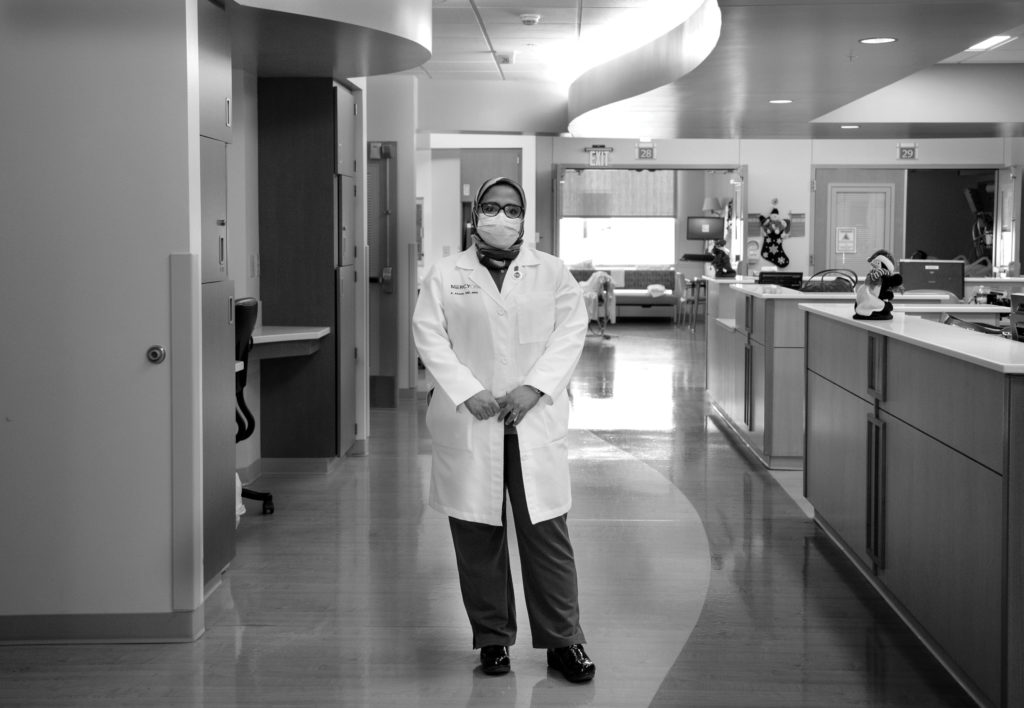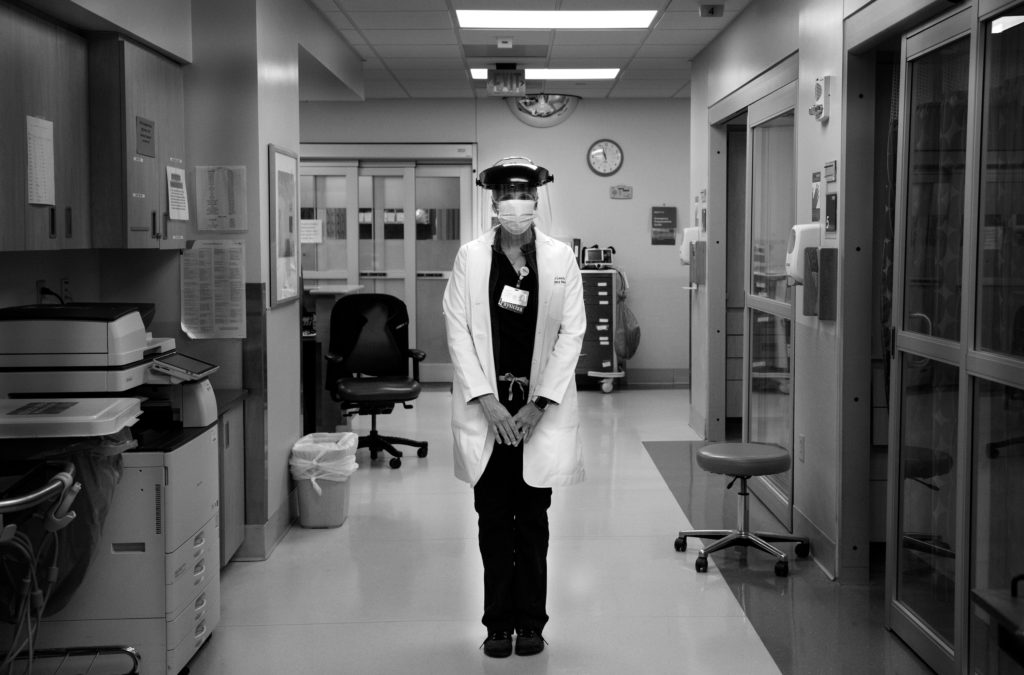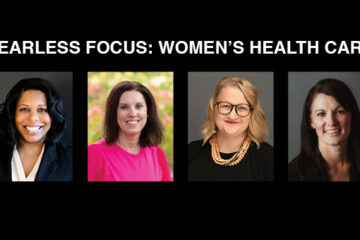By Emily Kestel, Fearless editor
One year ago, vaccinations against COVID-19 were just becoming widely available. Health care workers were optimistic that the public would largely accept the vaccine and the light at the end of the tunnel was nearing. Close to 500,000 Americans had died from COVID-19 – 5,000 of them Iowans.
Now, the national death toll is more than 900,000, and the death toll in Iowa is more than 8,600. Just over 60% of Iowans are fully vaccinated against COVID, and the omicron variant led to an increase in hospitalization numbers not seen since the latter half of 2020. Staffing shortages spurred by positive COVID tests and an increase in health care workers quitting have pushed hospitals across the country to near-breaking points.
MercyOne spokesperson Marcy Peterson said MercyOne is experiencing a “critical staffing shortage” and seeing higher turnover rates, shortened careers and early retirements.
Women hold more than 75% of health care jobs and make up more than one-third of all physicians in the U.S. However, research shows that female physicians experience higher rates of burnout and depression.
We checked in with two female physicians at MercyOne Des Moines whom we spoke with last year to see what they’re currently facing.
‘The compassion fatigue has set in’

Dr. Aneesa Afroze is an infectious disease consulting physician, president of medical staff and director for antimicrobial stewardship at MercyOne.
Last year, Afroze expressed concern about lasting mental health consequences as a result of witnessing so much death, and hoped for a quick return to normalcy. At that time, she said although counseling was offered by administrative leadership, health care workers had no time for it. “We have no time to pause and seek help for ourselves at this time,” she said.
Now, Afroze continues to illustrate the mental health effects on health care workers, but questions whether a return to normal is in the immediate future.
The following remarks have been edited and condensed for clarity and have been formatted to be in her own words.
Although the view of the pandemic has changed, the misery and frustrations have not. We still live in fear and have flashbacks of what we’ve seen and been through.
Each and every person on the front lines is facing mental health challenges. They are still going on and on without a stop date. Many front-line health care workers have sought mental health services for depression and PTSD. I think people are wanting to focus on themselves before they shatter.
Never in my life did I think I would talk to a counselor, but there was a time that I had to seek one out. One of my colleagues encouraged me to reach out after she had done it. She gave me the counselor’s phone number.
I sat on it for almost two months. Physicians especially think that we’re very resilient and we can overcome anything ourselves. I couldn’t make myself call and set up the appointment. So I texted the counselor. I did three telehealth sessions. I realized although they may not know what you’re facing, there are people who will still listen and give you tips here and there. I think that really helps. Support from family, friends and the community is very important.
I wish I could be optimistic. But the desire to get back to a normal life is kind of fading away a little bit, although it’s still there. Health care workers are questioning, “Is this our new normal? How long is it going to go on? Will we ever get our lives back again?” I think it will take a long, long time.
We all fight to save every life. There are many, many people who are grateful for care and for the nurses at their bedside. But there’s also a lot of negativity around health care workers, and that has affected some people.
Last year there was so much empathy, compassion and feeling bad for the patients who were sick and dying because there was nothing we could really do. But we have a few weapons that we can now use to protect people and help curb this pandemic.
For health care workers, I think the compassion fatigue has set in. I think those emotions have turned into more anger and frustration, especially when they see unvaccinated people or people who don’t believe in masking.
Many health care workers have sort of given up in the sense that we’re not going to lecture people regarding vaccinations if they’re not vaccinated. Everybody’s tired of talking about the same thing again and again and again. It just drains you. It exhausts you. Sometimes by the end of the day you’re just so tired. You’re like, “They’re not going to hear us anyways, so why spend another 15 minutes explaining?”
It’s good that many, many people get over it, but we see the misery, the devastation. We don’t see the people who are sitting at home and getting over this.
It’s going to take a while to get over all these things, the sleepless nights or the flashbacks that you have of people who were dying or people who were really sick. I think everybody feels that there is no end to it. The damage is still happening. We’re not even in the recovery phase.
There are days, especially for front-line workers, where you just feel like you want to stop and run away from here. But then you also realize that you’ve signed up for this because you want to help people. That makes you come to work every day.
Even though you come in with a heavy heart thinking, “I am going to be exhausted by the end of the day,” you still come the next day. We have to tell ourselves that every day is not going to be the same, and eventually we are going to have some good days.
I use the word devastation a lot nowadays. With all that has happened, it’s like a part of your soul dies. The light of your soul dims off with some of the really emotionally draining days.
The negativity against physicians, providers and nurses should end. I want people to believe the misery, the emotional toll that all this devastation has taken on us. We want to be positive but we have to see something positive out there.
‘I don’t know anybody who works in the emergency department who hasn’t had some signs of burnout’

Dr. Sydney Leach is an emergency department physician and the associate director of the emergency department at MercyOne Des Moines.
Last year, Leach said she was “cautiously optimistic” that the end was nearing. Using the metaphor of a marathon to describe the pandemic, she said she thought we were on mile 17.
Though she still maintains her optimism that COVID will eventually become something like the annual flu, Leach now thinks we’re at mile 20 or 21. “We’re hitting that wall, we’re just chugging through this and we’re not progressing. The miles are not progressing as quickly.”
The following remarks have been edited and condensed for clarity and have been formatted to be in her own words.
A year ago, there was still some trepidation about the unknowns of COVID-19 and how we would be able to treat it. It was new enough that it still felt a little bit unusual. Now it seems just so much more common, so the newness of it has worn off.
There used to be a lot of explanation with someone and fear for the patient and maybe a little bit from the provider when you were telling someone they’ve tested positive for COVID-19. There was this sort of feeling like, “Gosh, I don’t know what the course of this is going to be. I don’t really have many if any treatments to offer. We don’t know how to take care of this other than to give supportive care and give oxygen.”
Now when I explain to somebody that they have COVID, they’re not so surprised and fearful. It’s kind of like telling someone you’ve tested positive for influenza or RSV [respiratory syncytial virus].
When we happen to be diagnosing COVID and someone’s had their full vaccine, generally I’m pretty confident that the odds are in their favor and they’re going to be just fine.
But we’re still seeing cases that have been unfortunately really, really severe. There’s still been deaths associated with it, though it’s been a bit less. There’s been a huge amount of people getting it. This wave has been unbelievable as far as the number of people that have ended up in the emergency room with it.
I think it has gotten difficult for all of us in medicine knowing that this is preventable.
It’s getting difficult to see really sick patients who come in and are not vaccinated. We’ve been preaching this for over a year now, “Please get your vaccine, please get your booster. It’s going to cut down on the spread for everyone, but it’s most importantly going to affect you and your personal outcome if you or your loved one gets it.”
That juxtaposition of what you can find on the internet or from a lay person versus what the medical community has actually proven has been hard. It’s a position that we haven’t been in in medicine that much, at least in my career. It’s really, really hard to face that.
The frustrating part is they’re not only exposing themselves, but they’re exposing me as a health care provider and my family and my team and the staff. It then takes off part of our workforce because a certain percentage of us will catch it.
We’re working so short all the time. It’s just frustrating. We could potentially have had a better handle on this had you made a choice for the public rather than your own individual choice. You didn’t take into account the greater good of your community, your hospitals, the public health system and your schools.
We have increasing numbers of people to take care of and a decreased number of people to take care of them. That has continued since month two or three of the pandemic. We’ve lost a lot of our workforce, and wonderful people from our profession that just got tired of it or are looking for something different.
I don’t know anybody who works in the emergency department who hasn’t had some signs of burnout. How that manifests for each one of us can be different.
For me, sometimes it might be the lack of the excitement about going into work every day, thinking I’d rather work less hours or less shifts because it’s grueling when I’m there. Sometimes it can be trouble sleeping with the thought of the sickness of the patients and the worries of where this pandemic is headed.
One thing that’s big for me and for a lot of people is the loss of that emotional connection with your patients. If you’re seeing a lot of sick people, it can be hard to make that emotional connection with each and every one of them.
It’s extremely gratifying to help someone. So when you stop thinking about why you’re there and why you’re helping someone and how much you love to do that, that’s also a sign of burnout. That happens from time to time, especially with the more challenging conditions or the number of patients we’re required to take care of.
It’s been difficult for everyone to process how quickly things can change. I’ve never been in a situation in my life where all of a sudden one week you’ve got plans for vacation, and then the next week things are shut down.
I think we have seen a huge uptick in patients struggling with mental health issues as a result of how quickly things change, which has maybe led to some anxiety, depression, post-traumatic stress and grief. That’s something that we suddenly are having to deal with in the ER, too – just a huge number of people with mental health conditions. We never would have predicted that we’d need all of these therapists and psychiatrists and whatnot.
I have a friend who I work with who said, “Don’t let a good crisis go to waste.” I think we all need to personally take stock of where we are, where we were before and where we want to be. For some of us, this pandemic has given us a chance to take a step back and really think about things that are important to us in our lives.
I still enjoy my job. I still like working to make things better. I like supporting my colleagues. I love working with my teams of nurses. I like it when we’re all having a good day together and helping people. I think that we all just need to work on treating each other with a little bit of grace and forgiveness.
This article appeared in the weekly Fearless e-newsletter. Sign up to receive it for free at https://fearlessbr.com/e-newsletter/.


